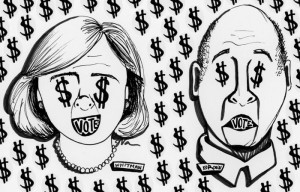Campaign contributions growing in size, power
If you’ve watched more than an hour of television since the beginning of October, it’s likely you’ve seen an advertisement either praising or bashing one of California’s two gubernatorial candidates: Republican Meg Whitman and Democrat Jerry Brown.
This election — like many of the current local, state and national elections — features two particularly antithetical candidates.
The one thing every candidate in every election has in common, however, is that none would be running for his desired position if it weren’t for campaign contributions.
The power of money in politics is not a modern phenomenon, and campaign finance reform has been an endeavor as old as politics itself, the most recent example of which is the McCain-Feingold Bipartisan Campaign Reform Act of 2002.
Nevertheless, legal loopholes have effectively mitigated even the most powerful campaign finance reform laws.
For example, there is a cap on the amount individuals can give directly to a candidate’s campaign, but labor unions, corporations and individuals have circumvented this law with “soft-money” contributions, which are paid to national parties and then used to finance state elections, with no limit.
Money will likely influence politics forever, but today’s campaign finance system has serious flaws.
Total contributions to all candidates in the 2008 presidential election reached more than $1.7 billion, triple the total amount raised in the 2000 presidential election, according to the Center for Responsive Politics.
And the total spent by presidential candidates during the 2008 presidential campaign reached more than $1.3 billion, almost four times the total amount spent during the 2000 presidential campaign.
If you didn’t count, that’s nine zeros. We’re talking about upwards of a billion dollars just in one year’s presidential election.
Money can’t buy votes, but it can buy voter influence. With effective political advertising, candidates and the parties, unions and corporations financially supporting them can impact and mobilize voters.
In effect, politicians with deep pockets or influential fundraisers have a significantly greater chance of being the candidate representing the Democratic or Republican Party in an election and winning that election.
The most important player in campaign finance isn’t the powerful lobbyist, mighty labor union, prosperous corporation or wealthy individual. Rather, it is the fundraiser or solicitor who has a large Rolodex with endless names of people willing to donate the maximum directly to a particular candidate.
These individuals are the unsung heroes who politicians flock to and serenade come campaign time.
Aside from the inherently uneasy feeling people have toward this more unsavory side of politics, there are many reasons why we should care about campaign contributions.
Fewer people are voting, while more and more money is being raised and spent during campaigns.
As a result, the small group of political donors and fundraisers is gaining power, while average Americans sit on the sidelines unaware of the rules and results of these political contests.
Moreover, candidates need outside money to run for office; Meg Whitman has raised $18,000,000 outside of what she’s pulled from her own wallet.
As a result, candidates themselves must spend a tremendous amount of time begging the rich or well connected, instead of promoting themselves to the ordinary voter.
Unfortunately, campaign finance reformers, while valiant in their efforts, have fallen short of success.
Lawmakers and citizens alike must ask themselves if the current system is fixable or beyond repair. But either way, something needs to be done.
Two advocates for recreating a new campaign finance system are Yale professors Bruce Ackerman and Ian Ayres.
Their 2002 book Voting With Dollars: A New Paradigm for Campaign Finance Reform describes and promotes a system with two distinctly new components: a mechanism to blind candidates from the names of their private contributors and a program that gives every voter a monetary credit of equal value to be deposited at secret donation booths.
Shielding candidates from their contributors eliminates the potential for quid pro quo dealings if a candidate is elected but still allows individuals to financially support candidates they believe are best fit to run a local, state or national office.
The monetary credit — or what Ackerman and Ayres call “Patriot dollars” — levels the playing field allowing all citizens to get involved, and the secrecy of the ballot box impedes special-interest dealings.
We need to find an answer to the problem of what is essentially legalized corruption in political campaigns throughout the United States.
The Ackerman and Ayres reform proposal offers a pragmatic solution that promises a significant reduction of private, self-interested contributions while opening campaign finance to all.
Removing money entirely from politics seems unrealistic, but institutionalizing a democratic form of campaign finance is a matter of will.
William Fay is a senior majoring in international relations.

